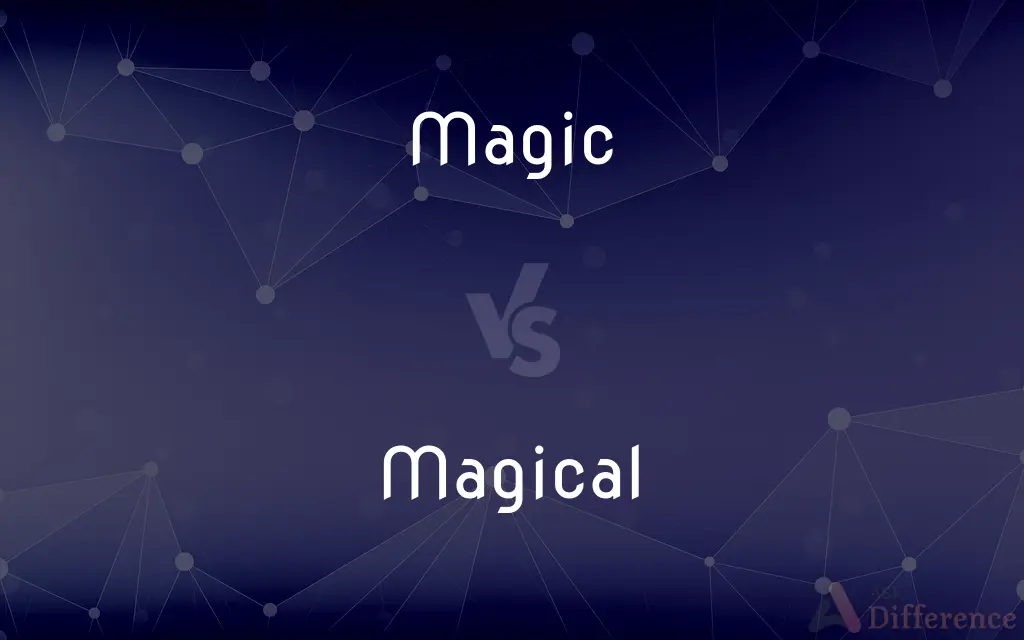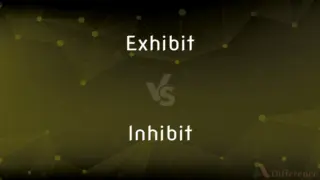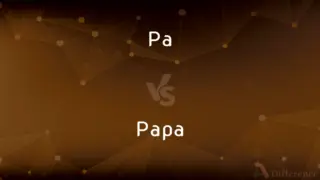Magic vs. Magical — What's the Difference?
By Tayyaba Rehman & Maham Liaqat — Updated on May 3, 2024
Magic pertains to the art of producing illusions or supernatural effects, whereas magical describes the wondrous or enchanting quality associated with such phenomena.

Difference Between Magic and Magical
Table of Contents
ADVERTISEMENT
Key Differences
Magic involves practices or techniques intended to manipulate supernatural forces, while magical refers to something that evokes a sense of wonder or disbelief through its connection to magic.
In cultural contexts, magic can represent a formal set of rituals or performances, such as stage magic or sorcery, whereas magical often characterizes the feelings or experiences these practices elicit.
Magic is used as a noun to describe the phenomenon or the act itself, whereas magical is an adjective, describing the nature or quality of something.
Objects, events, or people can be involved in magic (e.g., a magic trick or a magic ceremony), on the other hand, the adjective magical is used to modify nouns, attributing them with enchanting qualities (e.g., a magical night).
While magic often carries various cultural and historical connotations depending on its use in different societies, the use of magical is more universal, primarily highlighting the extraordinary or delightful aspects.
ADVERTISEMENT
Comparison Chart
Part of Speech
Noun
Adjective
Usage
Describes acts or phenomena
Describes qualities or feelings
Contexts
Ceremonies, tricks, spells
Describing atmospheres, experiences
Cultural Connotation
Varied, specific to cultures
Generally positive, enchanting
Typical Combinations
Magic show, magic wand
Magical moment, magical view
Compare with Definitions
Magic
The art of producing illusions as entertainment by the use of sleight of hand, deceptive devices, etc.
He learned magic from a professional magician.
Magical
Pertaining to or characterized by magic.
The forest had a magical glow under the moonlight.
Magic
A mysterious quality of enchantment.
The magic of the movie won over audiences worldwide.
Magical
Producing or using spells and enchantments.
The story revolves around a magical kingdom.
Magic
The use of means (such as charms or spells) believed to have supernatural power over natural forces.
Magic has been a part of human history across various cultures.
Magical
Supernaturally influenced or controlled.
They experienced a magical transformation.
Magic
Something that has a delightfully unusual quality.
The invention of the internet was like magic at its dawn.
Magical
Having a special, mysterious charm or allure.
Her voice had a magical quality that captivated everyone.
Magic
An extraordinary power or influence seemingly from a supernatural source.
The survivors of the crash attributed their luck to magic.
Magical
Beautiful or delightful in a way that seems removed from everyday life.
The view from the mountain top was magical.
Magic
The power of apparently influencing events by using mysterious or supernatural forces
Suddenly, as if by magic, the doors start to open
Magical
Relating to, using, or resembling magic
Magical healing powers
Magic
Having or apparently having supernatural powers
A magic wand
Magical
Beautiful or delightful in a way that seems removed from everyday life
It was a magical evening of pure nostalgia
Magic
Wonderful; exciting
It was a great time, magic
Magical
Of, relating to, or produced by magic.
Magic
Move, change, or create by or as if by magic
He must have been magicked out of the car at the precise second it exploded
Magical
Enchanting; bewitching
A magical performance of the ballet.
Magic
The art or practice of using charms, spells, or rituals to attempt to produce supernatural effects or control events in nature.
Magical
Of, relating to, or by means of magic.
Magic
The charms, spells, and rituals so used.
Magical
Enchanting.
The fireworks created a magical atmosphere in that beautiful summer night.
Magic
The exercise of sleight of hand or conjuring, as in making something seem to disappear, for entertainment.
Magical
Possessing or using or characteristic of or appropriate to supernatural powers;
Charming incantations
Magic signs that protect against adverse influence
A magical spell
'tis now the very witching time of night
Wizard wands
Wizardly powers
Magic
A mysterious quality of enchantment
"For me the names of those men breathed the magic of the past" (Max Beerbohm).
Magic
Of, relating to, or invoking the supernatural
"stubborn unlaid ghost / That breaks his magic chains at curfew time" (John Milton).
Magic
Possessing distinctive qualities that produce unaccountable or baffling effects.
Magic
To produce, alter, or cause by or as if by magic
"Intelligent warm-hearted Gertrude had magicked him into happiness" (Iris Murdoch).
Magic
To cause to disappear by or as if by magic. Used with away
His shoes had been magicked away in the night.
Magic
The application of rituals or actions, especially those based on occult knowledge, to subdue or manipulate natural or supernatural beings and forces in order to have some benefit from them.
Magic
A specific ritual or procedure associated with such magic; a spell.
Magic
The supernatural forces which are drawn on in such a ritual.
Magic
Something producing successful and remarkable results, especially when not fully understood; an enchanting quality; exceptional skill.
Magic
Complicated or esoteric code that is not expected to be generally understood.
Magic
A conjuring trick or illusion performed to give the appearance of supernatural phenomena or powers.
Magic
The art or practice of performing conjuring tricks and illusions.
Magic
Having supernatural talents, properties or qualities attributed to magic.
A magic wand
A magic dragon
Magic
Producing extraordinary results, as though through the use of magic.
A magic moment
Magic
Pertaining to conjuring tricks or illusions performed for entertainment etc.
A magic show
A magic trick
Magic
(colloquial) Great; excellent.
I cleaned up the flat while you were out. —Really? Magic!
Magic
(physics) Describing the number of nucleons in a particularly stable isotopic nucleus; 2, 8, 20, 28, 50, 82, 126, and 184.
Magic
(programming) Being a literal number or string value with no meaning or context, not defined as a constant or variable
The code is full of magic numbers and we can't figure out what they mean.
Magic
(transitive) To produce, transform (something), (as if) by magic.
Magic
A comprehensive name for all of the pretended arts which claim to produce effects by the assistance of supernatural beings, or departed spirits, or by a mastery of secret forces in nature attained by a study of occult science, including enchantment, conjuration, witchcraft, sorcery, necromancy, incantation, etc.
An appearance made by some magic.
Magic
The art of creating illusions which appear to the observer to be inexplicable except by some supernatural influence; it includes simple sleight of hand (legerdemain) as well as more elaborate stage magic, using special devices constructed to produce mystifying effects; as, the magic of David Copperfield. It is practised as an entertainment, by magicians who do not pretend to have supernatural powers.
Magic
Pertaining to the hidden wisdom supposed to be possessed by the Magi; relating to the occult powers of nature, and the producing of effects by their agency.
Magic
Performed by, or proceeding from, occult and superhuman agencies; done by, or seemingly done by, enchantment or sorcery; as, a magical spell.
The painter's magic skill.
Magic
Any art that invokes supernatural powers
Magic
An illusory feat; considered magical by naive observers
Magic
Possessing or using or characteristic of or appropriate to supernatural powers;
Charming incantations
Magic signs that protect against adverse influence
A magical spell
'tis now the very witching time of night
Wizard wands
Wizardly powers
Common Curiosities
How does culture affect the interpretation of magic?
Cultural background can significantly influence what is considered magic, varying from supernatural practices to simple illusions.
In what genres is the term "magical" most frequently found?
The term "magical" is most frequently found in fantasy, romance, and children's literature, where it enhances the narrative with enchantment and wonder.
What might be considered a magical experience?
Experiencing something exceptionally beautiful or awe-inspiring, like seeing the northern lights, can be described as magical.
What types of magic are commonly practiced?
Common types of magic include stage magic, used for entertainment, and ceremonial or ritual magic, which is often rooted in religious or spiritual beliefs.
Are magical effects always linked to positive outcomes?
Not necessarily; while magical often implies a positive and enchanting quality, it can also be used in contexts where the effects are mysterious or unforeseen.
Can "magic" and "magical" be used interchangeably?
No, "magic" is a noun or verb, while "magical" is an adjective.
How is "magical" used differently from "magic"?
Magical is an adjective used to describe things that are enchanting or charming, often in a supernatural way.
Is there a scientific basis for magic?
No, magic as a form of supernatural manipulation lacks scientific basis; however, the psychological and perceptual techniques used in stage magic are well studied.
What is an example of a magical feeling in everyday life?
A magical feeling in everyday life could be the sense of joy and wonder when witnessing a stunning sunset or the birth of a child.
What is the primary use of the word "magic"?
Magic primarily refers to the art of performing illusions and manipulating supernatural forces.
How does the concept of magic differ in various cultures?
In various cultures, magic can be viewed as a respectable practice, a form of folklore, or even taboo, depending on the region's historical, religious, and social contexts.
Can the word "magical" apply to scientific phenomena?
Yes, "magical" can be used metaphorically to describe scientific phenomena that are particularly awe-inspiring or difficult to believe, despite being natural.
Does the use of "magic" in entertainment differ from historical uses?
Yes, in entertainment, magic is often portrayed as a benign and fun spectacle, whereas historically, it could be associated with mysticism, fear, or reverence.
How do children typically perceive the concept of magical?
Children often perceive the concept of magical as literally involving enchantment and wonder, closely tied to fairy tales and imaginative play.
Can technology ever be considered magical?
Technology can be considered magical when it produces effects that seem inexplicable or revolutionary to its users, echoing Arthur C. Clarke's adage that "any sufficiently advanced technology is indistinguishable from magic."
Share Your Discovery

Previous Comparison
Exhibit vs. Inhibit
Next Comparison
Pa vs. PapaAuthor Spotlight
Written by
Tayyaba RehmanTayyaba Rehman is a distinguished writer, currently serving as a primary contributor to askdifference.com. As a researcher in semantics and etymology, Tayyaba's passion for the complexity of languages and their distinctions has found a perfect home on the platform. Tayyaba delves into the intricacies of language, distinguishing between commonly confused words and phrases, thereby providing clarity for readers worldwide.
Co-written by
Maham Liaqat















































